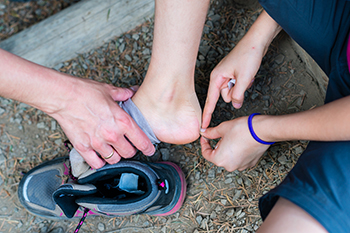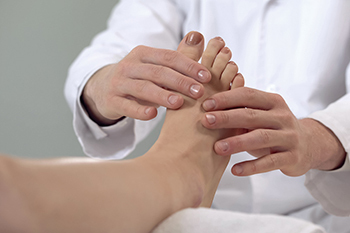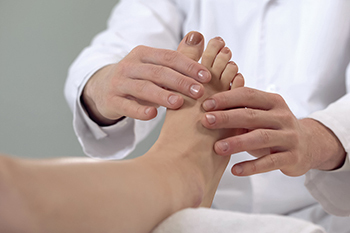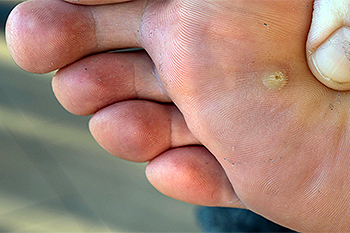Connect With Us
Blog
Items filtered by date: September 2022
Blisters on the Bottom of the Feet

Blisters can occur on the bottom of the feet for different reasons. Causes of foot blisters include dyshidrotic eczema from seasonal allergies or stress, friction from repetitive rubbing of the feet on shoes and/or socks that are too tight, or athlete’s foot infections. However, injuries or underlying medical conditions can also lead to foot blisters. Blisters can produce issues ranging from mild discomfort to severe pain and bleeding. It is important not to try to burst a blister. If it does burst, it will likely produce more discomfort. If you have foot blisters and you do not know the cause, they are becoming worse, or not healing, seek medical advice. Diabetics should take particular heed of this advice because if they suffer from neuropathy, they may not notice that a blister may turn into an ulcer and possibly cause dangerous complications. See a podiatrist for the proper diagnosis and care of blisters.
Blisters may appear as a single bubble or in a cluster. They can cause a lot of pain and may be filled with pus, blood, or watery serum. If your feet are hurting, contact Vivian C. Iwu, DPM of Choice Podiatry Center. Our doctor can provide the care you need to keep you pain-free and on your feet.
Foot Blisters
Foot blisters are often the result of friction. This happens due to the constant rubbing from shoes, which can lead to pain.
What Are Foot Blisters?
A foot blister is a small fluid-filled pocket that forms on the upper-most layer of the skin. Blisters are filled with clear fluid and can lead to blood drainage or pus if the area becomes infected.
Symptoms
(Blister symptoms may vary depending on what is causing them)
- Bubble of skin filled with fluid
- Redness
- Moderate to severe pain
- Itching
Prevention & Treatment
In order to prevent blisters, you should be sure to wear comfortable shoes with socks that cushion your feet and absorb sweat. Breaking a blister open may increase your chances of developing an infection. However, if your blister breaks, you should wash the area with soap and water immediately and then apply a bandage to the affected area. If your blisters cause severe pain it is important that you call your podiatrist right away.
If you have any questions, please feel free to contact our office located in Marietta, GA . We offer the newest diagnostic and treatment technologies for all your foot care needs.
Orthotics and Overpronation

Overpronation is a type of gait that occurs when an individual’s feet roll excessively downward or inward during movement. To mitigate overpronation, you might be able to use orthotics, which are shoe inserts that correct foot or gait abnormalities. If you have overpronation, you may benefit from using custom-made orthotics that are designed after conducting an analysis of your individual walking style and tendencies. In some cases, individuals who wore orthotics to correct their overpronation demonstrated better balance and even a reduction in pain. If you suspect that you have overpronation, contact a podiatrist (a foot specialist) who can determine whether wearing supportive orthotics can positively impact your gait.
If you are having discomfort in your feet and would like to try orthotics, contact Vivian C. Iwu, DPM from Choice Podiatry Center. Our doctor can provide the care you need to keep you pain-free and on your feet.
What Are Orthotics?
Orthotics are inserts you can place into your shoes to help with a variety of foot problems such as flat feet or foot pain. Orthotics provide relief and comfort for minor foot and heel pain but can’t correct serious biomechanical problems in your feet.
Over-the-Counter Inserts
Orthotics come in a wide variety of over-the-counter inserts that are used to treat foot pain, heel pain, and minor problems. For example, arch supports can be inserted into your shoes to help correct overarched or flat feet, while gel insoles are often used because they provide comfort and relief from foot and heel pain by alleviating pressure.
Prescription Orthotics
If over-the-counter inserts don’t work for you or if you have a more severe foot concern, it is possible to have your podiatrist prescribe custom orthotics. These high-quality inserts are designed to treat problems such as abnormal motion, plantar fasciitis, and severe forms of heel pain. They can even be used to help patients suffering from diabetes by treating foot ulcers and painful calluses and are usually molded to your feet individually, which allows them to provide full support and comfort.
If you are experiencing minor to severe foot or heel pain, it’s recommended to speak with your podiatrist about the possibilities of using orthotics. A podiatrist can determine which type of orthotic is right for you and allow you to take the first steps towards being pain-free.
If you have any questions please contact our office located in Marietta, GA . We offer the newest diagnostic and treatment technologies for all your foot and ankle needs.
Reminder: When Was the Last Time...?
Selecting Shoes For Your Child

As your toddler grows and matures, their feet are also growing and developing at the same time. Since your child’s feet are an important part of their body, selecting the right kind of shoe is imperative to maintaining overall foot health. This is true especially because the bones in a young child’s feet are still soft and ill-fitting shoes can exacerbate any existing foot deformities in a toddler. There are several things to keep in mind when shopping for your child’s shoes. First, you can be mindful of selecting shoes that have velcro straps. This can help ensure that both you and your child can keep the shoes fastened onto the feet. Second, you can look for shoes that have a spacious toe box, which will not crowd the child’s toes. Lastly, in terms of material, it can be important to select shoes that are made of breathable material, such as leather or mesh. This mesh is comparable to that used in running shoes. You may notice that a child will tend to grow out of their shoes at a seemingly rapid pace. However, it is nonetheless important to find shoes that are of high quality for your child. If you are concerned about your child’s shoes, please consult with a podiatrist who can help you.
Making sure that your children maintain good foot health is very important as they grow. If you have any questions, contact Vivian C. Iwu, DPM of Choice Podiatry Center. Our doctor can provide the care you need to keep you pain-free and on your feet.
Keeping Children's Feet Healthy
Having healthy feet during childhood can help prevent medical problems later in life, namely in the back and legs. As children grow, their feet require different types of care. Here are some things to consider...
Although babies do not walk yet, it is still very important to take care of their feet.
Avoid putting tight shoes or socks on his or her feet.
Allow the baby to stretch and kick his or her feet to feel comfortable.
As a toddler, kids are now on the move and begin to develop differently. At this age, toddlers are getting a feel for walking, so don’t be alarmed if your toddler is unsteady or ‘walks funny’.
As your child gets older, it is important to teach them how to take care of their feet.
Show them proper hygiene to prevent infections such as fungus.
Be watchful for any pain or injury.
Have all injuries checked by a doctor as soon as possible.
Comfortable, protective shoes should always be worn, especially at play.
If you have any questions please feel free to contact our office located in Marietta, GA . We offer the newest diagnostic and treatment technologies for all your foot and ankle needs.
Uncomfortable Plantar Warts

Plantar warts are found on the bottom of the feet, and can be very painful. The majority of warts grow outward, but plantar warts grow inward as a result of standing and walking for most of the day. The medical name for this type of wart is a verruca, and is connected with the human papillomavirus (HPV). The wart appears as a small, thickened area of skin on the bottom of the foot, and many times will have tiny black dots in the center. The virus can enter the body through small cracks in the skin of the feet, and generally lives in warm and moist environments. These can include public swimming pools, shower room floors, and locker rooms. It is advised that appropriate shoes, like flip flops or water shoes, are worn while in these areas. Plantar warts can be extremely uncomfortable, and many patients seek immediate relief. If you are afflicted with a plantar wart, please consult with a podiatrist who can discuss several effective treatment options with you.
Plantar warts can be very uncomfortable. If you need your feet checked, contact Vivian C. Iwu, DPM from Choice Podiatry Center. Our doctor will assist you with all of your foot and ankle needs.
About Plantar Warts
Plantar warts are the result of HPV, or human papillomavirus, getting into open wounds on the feet. They are mostly found on the heels or balls of the feet.
While plantar warts are generally harmless, those experiencing excessive pain or those suffering from diabetes or a compromised immune system require immediate medical care. Plantar warts are easily diagnosed, usually through scraping off a bit of rough skin or by getting a biopsy.
Symptoms
- Lesions on the bottom of your feet, usually rough and grainy
- Hard or thick callused spots
- Wart seeds, which are small clotted blood vessels that look like little black spots
- Pain, discomfort, or tenderness of your feet when walking or standing
Treatment
- Freezing
- Electric tool removal
- Laser Treatment
- Topical Creams (prescription only)
- Over-the-counter medications
To help prevent developing plantar warts, avoid walking barefoot over abrasive surfaces that can cause cuts or wounds for HPV to get into. Avoiding direct contact with other warts, as well as not picking or rubbing existing warts, can help prevent the further spread of plantar warts. However, if you think you have developed plantar warts, speak to your podiatrist. He or she can diagnose the warts on your feet and recommend the appropriate treatment options.
If you have any questions please feel free to contact our office located in Marietta, GA . We offer the newest diagnostic and treatment technologies for all your foot and ankle needs.


